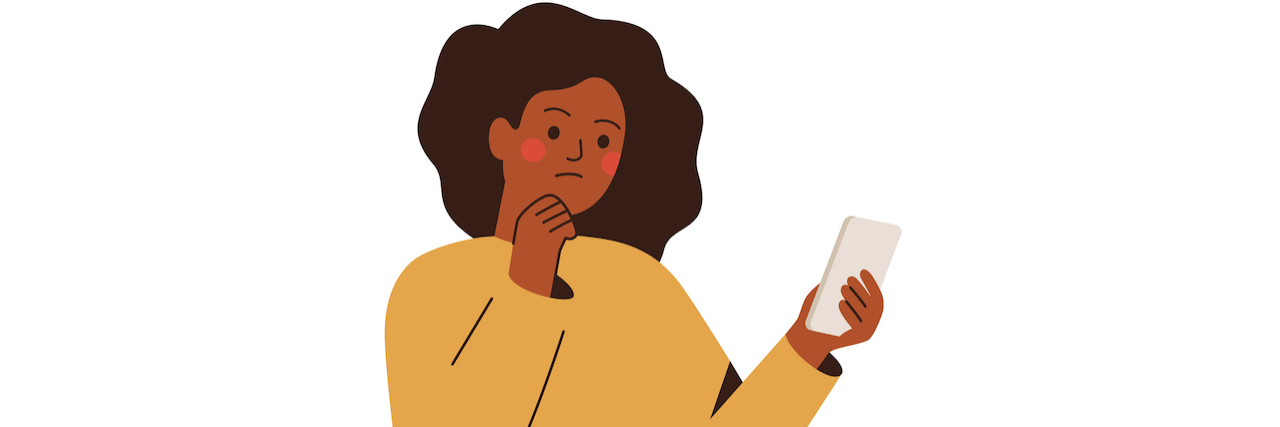If you’re struggling with your mental health and don’t know where to turn, you may wonder where you can seek help for your specific triggers. You may also want to find someone who can help keep you out of crisis when you feel like you’re in danger and your mental health provider is unreachable. Fortunately, there are plenty of mental health hotlines you can call or text when you’re in crisis — even ones for specific types of crises. Here are six mental health resources to help you through any type of crisis.
1. National Suicide Prevention Lifeline
If you’re struggling with suicidal thoughts, the National Suicide Prevention Lifeline is there for you. You can reach the free, confidential hotline at 1-(800)-273-8255, and a trained crisis counselor will help you work through your suicidality. If you need to keep your thoughts and feelings a bit more private, the Lifeline also has a confidential chat feature you can use to connect to a crisis counselor without saying a word. The Lifeline, which is available 24/7, can supply you with resources and strategies you can use to keep yourself safe.
2. NEDA Helpline
On your most difficult days with your eating disorder, you may feel like you need extra help, and reaching out to the NEDA Helpline can help you access the support you need. If you need help, text NEDA to 741-741, and a trained volunteer will help you process your thoughts and emotions. The text feature is available to use Monday through Thursday from 9 am-9 pm ET, and Friday from 9 am-5 pm ET. If you need to reach someone outside of these hours, NEDA also uses 1-(800)-273-8255 to help those who are deep in their eating disorders, and it’s available to call anytime you need some additional support.
3. National Domestic Violence Hotline
If you’re a domestic violence survivor and need urgent support, the National Domestic Violence Hotline can confidentially respond to you, ensure you’re in a safe place to talk and help you formulate a plan. The Hotline has phone, chat and text options to reach survivors in all types of areas and situations, so you can choose the safest option to fit your needs. When you call the Hotline at 1-(800)-799-7233, text START to 88788 or chat online, you’ll reach an advocate who can help you figure out what to do next. The site even lays out the types of questions your advocate may ask you — so you’ll know what to expect when you reach out.
4. National Sexual Assault Hotline
If you’ve experienced sexual assault, sexual abuse, rape or sexual violence — or are coping with its aftermath — the National Sexual Assault Hotline can help you. The hotline is free, confidential and always available, and it has both phone and app options, so you can choose how you’d like to receive support. When you call the Hotline at 1-(800)-656-4673 or open the app, you’ll be paired with a trained staff member who can help you process what happened to you, help you plan next steps and connect you with referrals and resources in your area.
5. Crisis Text Line
Mental health crises can be overwhelming, but if you prefer text-based support to talking over the phone, the free, confidential Crisis Text Line can help support you. To start texting with a trained volunteer, text START to 741-741. You’ll be asked to briefly describe the nature of your crisis — which can include nearly any mental health crisis — and be matched with a trained volunteer who will listen to you, provide you with ways to stay safe based on what’s helped you in the past and send you resources you can use to help de-escalate your state of crisis. The Crisis Text Line is also available 24/7, so you can always connect with someone if you need immediate support.
6. TrevorLifeline
Being part of the LGBTQIA+ community can contribute to feelings of isolation, danger and crisis, but if you’re LGBTQIA+ and in need of support, The Trevor Project’s TrevorLifeline can help you through your times of crisis. You can call 1-(866)-488-7386, text START to 678-678 or chat online with a trained, LGBTQIA+ friendly crisis counselor. No matter which way you choose to reach out, the TrevorLifeline is available 24/7 every day, so you’ll always have access to nonjudgmental listeners who can help you through anything you’re going through. The TrevorLifeline website even has breathing exercises to try while you wait for your crisis counselor to respond, as well as resources that can help you find additional support.
Getty image by Ponomariova_Maria

